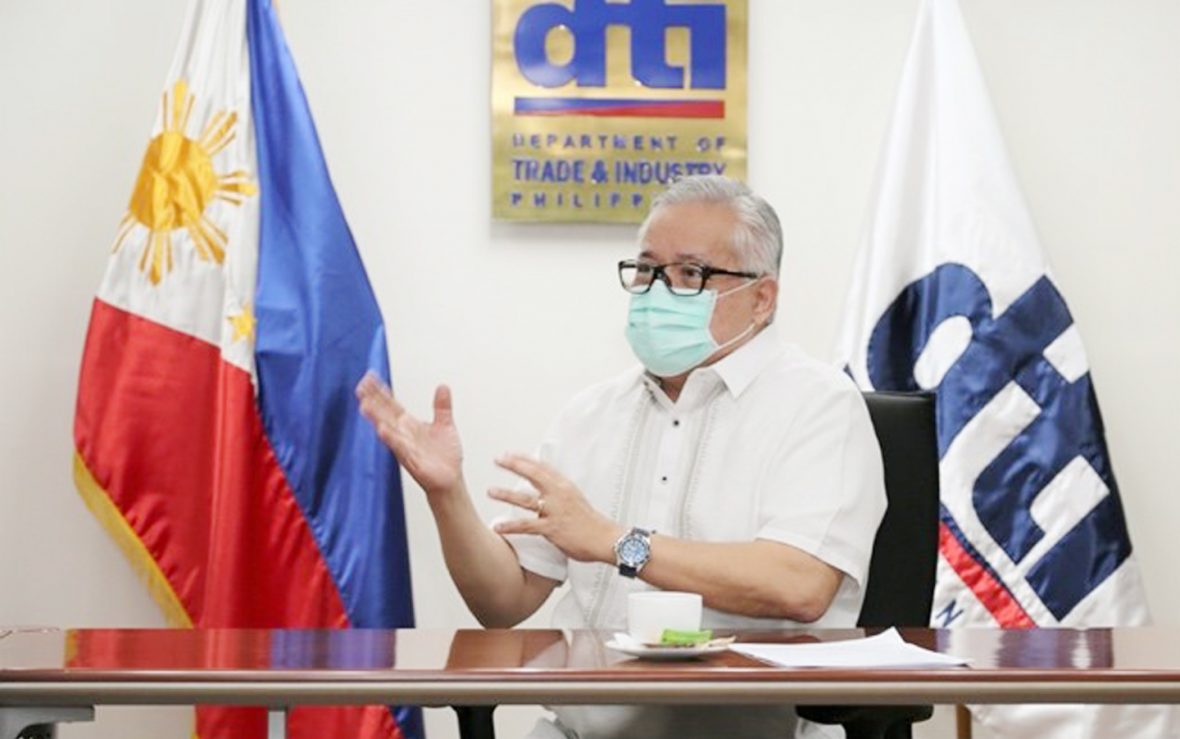The Department of Trade and Industry (DTI) once again held its annual Slingshot Conference on Thursday, 18 November 2021during the virtual Philippine Startup Week 2021. Anchored on this year’s PHSW21 theme, “Beyond Recovery: Filipino Startups Redefining Opportunity,” the Slingshot Conference aims to enable the Philippine startup ecosystem to scale and develop its ability to cater to the global market in these challenging times and beyond.
In his welcome remarks, DTI Secretary Ramon Lopez shared the latest developments in the country’s startup ecosystem, such as the funding raised, coupled with our steady supply of dynamic and highly innovative talent. He reiterated the Department’s support and commitment towards developing impactful and sustainable programs as we move towards the country’s goal of developing globally competitive and innovative industry sectors. “As we look forward to the coming months, let us continue working together and build upon our key advantages in fintech, e-commerce, manufacturing, and digital services. The increased adoption of digital technologies will be our means to sustain our economic growth and competitiveness in the coming years,” Secretary Lopez said.
Excerpts of the ceremonial launch of the Project Match Program held on the 1st day of PHSW21 was also featured. Project Match aims to aid our MSMEs in their digital transformation journey by connecting them with startups that can provide them with digital solutions and services. This initiative is a collaboration between and among DTI, Startup Village, and USAID DELIVER in further cooperation with DOST, DICT, and other national government agencies.
Moreover, DTI Undersecretary Rafaelita Aldaba talked about the framework and post-pandemic way forward for the Philippine startup ecosystem. In her presentation, she emphasized the critical role of startups towards the country’s recovery. “Startups emerged as key drivers of economic growth and can be catalysts for disruptive innovation,” Undersecretary Aldaba remarked.
The 2021 Slingshot Conference also featured speakers across the globe, including Mr. Stephan Kuester, Head of Ecosystem Strategy of Startup Genome, who briefly discussed the insights, strengths, and gaps in Manila’s startup ecosystem as analyzed in the 2021 Global Startup Ecosystem Report. Another keynote speaker Ms. Julie Jun, Senior Manager of Gyeonggi Center for Creative Economy & Innovation (GCCEI), shared the real-life Korean Sandbox and highlighted the role of the Korean government in leading national growth through fostering small and venture businesses.
In her remarks, Ms. Kat Borlongan, renowned Filipina entrepreneur and former director of La French Tech, which is a startup movement coordinated by the French government, highlighted that the Philippines could learn from how the French government, particularly its President, has led the development of startup strategies by thinking of startups almost as practically part of its national interest. She emphasized the need for collaboration towards growing unicorns, which “has to do with infrastructure, culture, it has to do with the environment, it has to do with the regulatory relationships that people have for this to happen. And the government has a big role to play.”
There were three-panel sessions in the Slingshot Conference. The first session, entitled “Financial Inclusion in the Digital Economy: Accelerating Post Pandemic Recovery,” was composed of speakers from digital banks and regulators from Bangko Sentral ng Pilipinas, Securities and Exchange Commission, UBx Philippines, GCash, and NextPay. This session emphasized that fintech is all about compliance, trust, security, and the safety of the consumer. It also stressed that collaboration among fintech companies and regulators and financial literacy among Filipinos are critical towards financial inclusion.
The second panel, which is about eCommerce, logistics, and digital market, was represented by speakers from Lazada Philippines, Bayan Academy, and Ninja Van. This session discussed how the pandemic impacted consumer and seller behavior towards digitalization, with Lazada citing an increase in the number of MSMEs onboarding in the platform compared to the pre-pandemic period. Bayan Academy president Mr. Bernardo added that there is a big growth with people selling products online. Ninja Van CEO Mr. Cu, for his part, said that the challenge in this digital economy is ensuring that services are available to a wide range of consumers and can be accessed on consumers’ preferred platforms.
Lastly, the third panel entitled, “Fostering International Linkages, Participation, and Partnerships for Startups,” highlighted the role of DTI and its international partners in helping fast-track internationalization and globalization for Philippine startups and enterprises that are looking to scale and expand their capabilities, capacity, and markets beyond the country’s borders. Panelists from GCCEI, QBO Innovation Hub – IdeaSpace Foundation, and Israel Innovation Authority each shared their experiences and underlined the importance of collaboration as an essential part of the Philippines’ digital journey.
In closing, DTI Assistant Secretary Nap Juanillo reaffirmed that “it takes a whole-of-society approach to growing exceptional startups.” He also emphasized that the “Philippines’ greatest strength is its people, with the country having many brilliant, young, and innovative individuals. Thus, efforts must be focused on attracting talents so that we may establish an entrepreneurial ecosystem.”

